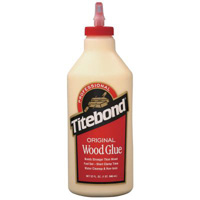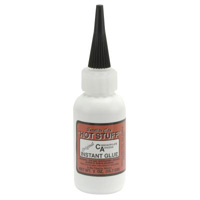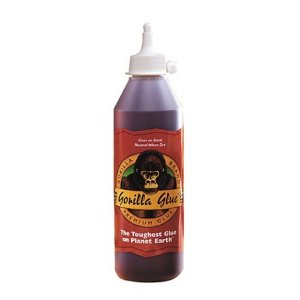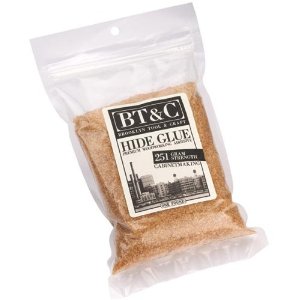Finding the best guitar building glue for a specific repair can be kind of confusing. There are a bunch of different types of glues that are used for all different repairs and fixes.
Beginners frequently ask me what type of glue I use to build and repair guitars. The answer to this is it depends what I am gluing. Different joints and different materials require different kinds of glue. That is why I decided to write this article. I’ll explain the different types of glues that I use and what applications they work best on.
List of Best Guitar Building Glues
Contents
Here is a list of the best guitar glue to use when fixing, repairing, or building a guitar.
Wood Glue for Guitars

Wood glue is used for exactly what you would think it is used for–to glue almost any different kind of wood. Modern wood glue is by far the glue that I use the most. Yellow or white wood glue is fast drying and holds a tight bond. It is good for gluing two pieces of unfinished wood other materials like nuts and binding strips. I use wood glue for almost everything when building a guitar. I use it to glue the body together, glue the neck on, and glue the binding on. Basically, I use it for everything except the few applications listed under the other glue types. If you are wondering what type of glue to use, chances are you will use wood glue.
Wood glue has many different applications and is nontoxic. It can also be heated up and removed fairly easily. This is important for repairs like neck resets and bridge adjustments. Personally, I like to use Titebond wood glue. I have used other brands before, but I like Titebond the best. You can buy some Titebond wood glue here.
What can you glue wood glue?
- Body
- Neck
- Bridge
- Binding
- Just about everything else
Super Glue for Guitars

Super glue is fast drying and extremely tight holding. It can also be dangerous. This cyanoacrylate-based glue can get on your fingers and adhere to almost anything. You have to be very careful when working with super glue. Always have solvent near by in case you get into trouble.
Super glue works well on small parts of the guitar. I wouldn’t use it to glue a body or something like that together. Unlike wood glue and hide glue, super glue is fairly permanent. It is extremely difficult to remove a super glued joint. If you glued a neck on with super glue, it might never come off. Most of the time I use super glue almost exclusively for fretboard and headstock work. Super glue works extremely well to glue inlays in the fretboard and headstock. It holds strong and sands easily. It also dries clear.
Be careful; do not use super glue to glue celluloid or other types of plastic binding. The chemicals in the glue can react with the materials in the binding and melt or start a fire. Not a good situation.
There are many different kinds of super glue out there, but I prefer Satellite City super glues. There are three different kinds that have different viscosity levels. Some can be used to float inlays and others can be used to repair cracks in ebony bridges and fretboards. Satellite City also makes accelerators and removal solvents. You can buy some Satellite City Super glue here.
What can you glue super glue?
- Fretboard Cracks
- Bridge Cracks
- Inlays
- Headstock overlays
Expanding Wood Glue & Gorilla Glue for Guitars

Expanding glue is essentially wood glue that foams up and expands when you apply it. This type of glue is great for extremely porous woods or joints that need the glue to creep into the wood.
I rarely use expanding glue when I’m building guitars. There really just isn’t a need for it. However, there is one application that I use expanding glue quite frequently: gluing on the fretboard. I put several lines of expanding glue down the middle of the neck and clamp the fretboard in place. The next day the glue expands, fills the entire joint, and foams out the sides. Expanding wood glue is extremely useful for gluing on fretboards and any other repairs that require glue to seep into hard to reach cracks and expand.
I have found that Gorilla glue works the best out of all the expanding wood glues that I have used. I like to stick with Gorilla expanding glue. You can buy some Gorilla glue here.
What can you glue Gorilla glue?
- Fretboard on neck
- Other joints that require glue to seep
Hide Glue for Guitars

Hide glue is pretty cool stuff. It consists of small flakes of animal hide that are mixed with water and heated for an hour or so. In other words, you actually make the glue yourself! If you ever repair a vintage instrument, you may run across some hide glue.
It is an extremely durable and strong holding glue. It is also easy to heat up and remove from joints in case you need to adjust something down the road. Most vintage guitars are glued together with hide glue because modern wood glue wasn’t feasible back then.
I always use hide glue when I am repairing a guitar with hide glue. I feel that it is important to restore the guitar to its original state–hide glue and all. Other than that, I don’t use hide glue that much in building my own guitars. Many builders swear by it, but it is too time consuming for me. I’d rather just use modern wood glue than bother making glue and applying it with a brush. You can buy some hide glue here.
What can you glue with Hide glue?
- Used on vintage instruments
- Can be interchangeable with modern wood glue
That’s a short explanation of the different types of glue that I use and what applications I use them for. I hope that helps with some of your gluing questions. Now that you know what to use, get your next guitar project ready for glue!

I have a Martin Road Series that was damaged by falling onto a cement floor. It sustained quite a large, nasty crack which “v’s” at the end.
Any suggestions for repair? It will more than likely never sound the same, however we would like to try due to the sentimental value. I can provide pictures if needed. Thank you for you time.
Gorilla glue is great for repair work
I have a sitka spruce top guitar that has a hole punched in it. I can push the wood back into place, and am considering using a CA like Satellite City HS-4 or BSI 103 super thin superglue to bond it once in place.
Any suggestions on this would be appreciated.
Thanks!